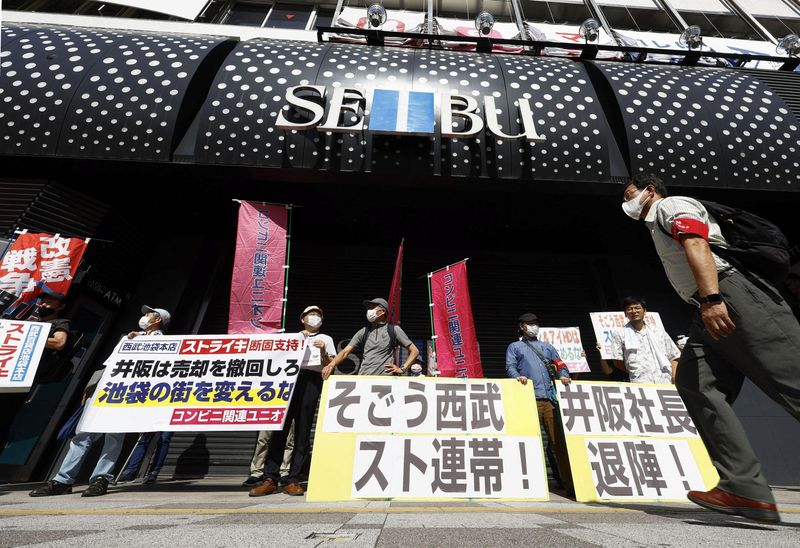
© Reuters. People supporting the strike by a workers union of Sogo & Seibu hold banners in front of the company’s flagship Seibu Ikebukuro store in Tokyo, Japan August 31, 2023, in this photo taken by Kyodo. The slogan on the banner in the centre reads, ‘Sogo &
2/2
By Mariko Katsumura and Ritsuko Shimizu
TOKYO (Reuters) -Workers at a major Tokyo department store went on strike on Thursday after talks with management over the planned sale of their company broke down, marking the first major walk-out the country has seen in decades.
Some 900 workers at the flagship Seibu store in the bustling district of Ikebukuro are protesting the planned sale of their company Sogo & Seibu, a unit of retail giant Seven & i, to U.S. fund Fortress Investment Group.
They are seeking job and business continuity guarantees, unhappy with reported plans for discount electronics retailer Yodobashi Holdings to take over roughly half of the store. Critics, which include officials in Ikebukuro, argue that such a change, which would replace many individual boutiques in store, would also cheapen the store’s image.
Strikes are extremely rare in Japan, where negotiations over wages and work conditions are typically agreed amicably. This one-day strike – the first at a major Japanese department store in 61 years – followed months of negotiations between Sogo & Seibu management and the workers’ union.
On Thursday morning, Seibu workers protested in front of the store while members of various other unions handed out flyers in support despite the summer heat, thronged by TV crew and photographers.
Satomi Saito, who had done some shopping at the store on Wednesday evening after hearing of the strike, was sympathetic.
“I don’t know whether their voices will be heard, but I think it’s important that they act,” she said.
Seven & i apologised for the strike and said the subsidiary would continue to hold talks with the union. Other Seibu and Sogo department stores were open for business as usual.
Fortress has declined to comment on the matter. A representative for Yodobashi, Fortress’s partner in the deal, was not immediately available to comment.
Despite the strike, Seven & i plans to formally announce the sale later on Thursday at a lower price than the 250 billion yen ($1.7 billion) originally flagged, according to a source familiar with the matter. Seven & i said nothing has been decided.
CAVEAT EMPTOR
The strike comes amid an extremely tight labour market in Japan, where workers at major companies won the biggest wage increases in three decades at labour negotiations this spring. Those gains have, however, been eroded by inflation at a 41-year high, and wages in real terms have continued to fall.
Sogo & Seibu’s workers had the support of labour groups from rival department stores Takashimaya, Isetan Mitsukoshi, Daimaru Matsuzakaya and Hankyu Hanshin, which attended a press conference this week announcing the intention to strike.
“I think many workers have gotten some encouragement from this case,” said Rikkyo University professor Wakana Shuto, who specialises in labour issues.
“Considering the industry’s difficulties, the conditions at Sogo & Seibu are not unique.”
The Seibu Ikebukuro store is Japan’s third-largest department store by sales, according to media reports, but its owner Sogo & Seibu has been in the red for the last four years and has some 300 billion yen in debt.
For overseas funds looking to restructure Japan Inc brands, the walk-out raises the spectre of similar hurdles, said Tokyo-based corporate lawyer Stephen Givens.
“You can acquire a Japanese company, as a foreigner, through brute force, and it’s not going to do you any good if the people who are actually managing the Japanese company and working for the Japanese company aren’t happy with results,” he said.
“This is one of the caveat emptor things that all foreign would-be acquirers should keep in mind.”
The strike is another headache for Seven & i, operator of the world’s largest convenience store chain 7-Eleven, which faces demands from overseas investors to improve profits.
The company in May fended off an attempt to shake up its management by U.S.-based ValueAct Capital, which has lobbied the company for years to sell off lower performing supermarket and department store units.
($1 = 145.8500 yen)








